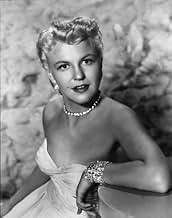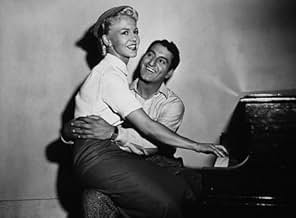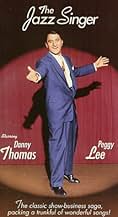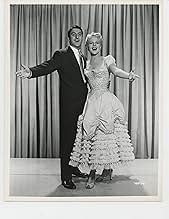Jerry rêve de devenir un célèbre chanteur de jazz. Pour y parvenir, il doit défier son père, un chantre juif, qui s'oppose à un tel destin pour son fils.Jerry rêve de devenir un célèbre chanteur de jazz. Pour y parvenir, il doit défier son père, un chantre juif, qui s'oppose à un tel destin pour son fils.Jerry rêve de devenir un célèbre chanteur de jazz. Pour y parvenir, il doit défier son père, un chantre juif, qui s'oppose à un tel destin pour son fils.
- Réalisation
- Scénario
- Casting principal
- Nommé pour 1 Oscar
- 1 nomination au total
Murray Alper
- Taxi Driver
- (non crédité)
Jimmy Ames
- Music Store Proprietor
- (non crédité)
Avis à la une
Angels sing above the Temple Sinai in Philadelphia, while dashing Danny Thomas (as Jerry Golding) returns from service in the Korean War. Celebrating the Jewish New Year (Rosh Hashanah), Mr. Thomas' observant parents Eduard Franz and Mildred Dunnock (as David and Ruth) are proud of their son's honorable discharge. Father Franz retires as cantor at the Temple so that Thomas can take over the position. The family has served as cantor for six generations. However, Thomas has decided to break with tradition. He wants to pursue a secular career in show business. Mother Dunnock seems understanding, but father Franz is righteously indignant. Life is tough for Thomas, but having singing girlfriend Peggy Lee (as Judy Lane) around helps...
In a part played by George Jessel on Broadway (1925-1926) and Al Jolson in the movies (1927), Thomas has big shoes to fill. Although he recorded his songs, some of Thomas' dubbing doesn't look authentic. Also, he has stand-up comic skills far superior to the flat routines you see here, which are evident in his long career. Other than that, Thomas is convincing in the role...
While a little lax in the dramatic scenes, Ms. Lee is the film's main asset. Her voice is exquisite and, more importantly, she and director Michael Curtiz make each musical number feel like it belongs exactly where it appears in the script. Unfortunately, Lee's role has been revised to match the religion of Thomas' character. This weakens the story's central conflict (between Thomas and Franz). It looks spectacular in Technicolor, but we wonder why Thomas' parents live in a luxurious palace, where modestly-attired mother Dunnock stands out by refusing a fur coat and dressing like the help. A consistent best supporting actress, Dunnock and Mr. Curtiz make her mother role the most technically well-drawn, with her final scene wordlessly offering conflict resolution.
****** The Jazz Singer (12/30/52) Michael Curtiz ~ Danny Thomas, Peggy Lee, Mildred Dunnock, Eduard Franz
In a part played by George Jessel on Broadway (1925-1926) and Al Jolson in the movies (1927), Thomas has big shoes to fill. Although he recorded his songs, some of Thomas' dubbing doesn't look authentic. Also, he has stand-up comic skills far superior to the flat routines you see here, which are evident in his long career. Other than that, Thomas is convincing in the role...
While a little lax in the dramatic scenes, Ms. Lee is the film's main asset. Her voice is exquisite and, more importantly, she and director Michael Curtiz make each musical number feel like it belongs exactly where it appears in the script. Unfortunately, Lee's role has been revised to match the religion of Thomas' character. This weakens the story's central conflict (between Thomas and Franz). It looks spectacular in Technicolor, but we wonder why Thomas' parents live in a luxurious palace, where modestly-attired mother Dunnock stands out by refusing a fur coat and dressing like the help. A consistent best supporting actress, Dunnock and Mr. Curtiz make her mother role the most technically well-drawn, with her final scene wordlessly offering conflict resolution.
****** The Jazz Singer (12/30/52) Michael Curtiz ~ Danny Thomas, Peggy Lee, Mildred Dunnock, Eduard Franz
Oy gevalt! What a disaster! Danny Thomas croons (badly), Danny Thomas tells jokes (badly) that are so corny and ancient Al Jolson would have been embarrassed to crack them, Danny Thomas emotes (badly, almost laughably). Opening scene had me wondering what all those goyim were doing in the temple! Peggy Lee was entertaining and a standout in this otherwise dreary film. The supporting cast were more-or-less adequate, with the mother and father characters well cast. Look for character actor William Schallert in a bit part, along with some other familiar faces. The Technicolor photography was superb. Watch all the scenes taking place in clubs across the nation and you'll notice that Danny and Peggy are using the exact same microphone in each one! My advice - stick with Jolie's groundbreaking original.
By 1952 Hollywood decided to remake the Al Jolson first-talking classic.
This time the Cantor's son was played by Danny Thomas. Coming home from the army, it is expected that he follow in the footsteps of his father and other male relatives by becoming a cantor. However, young Mr. Golding has quite a zest for show business.
At this time, he meets Peggy Lee, an aspiring singer. She acts very well and her rendition of her favorite song, Lover, is remarkable. The film writers were smart not to plug the obvious Jewish guy and non-Jewish girlfriend relationship. If anything, this is glossed over. In his anger, for betraying his pledge to become a cantor, his father makes the traditional Jewish sign indicative of a loss in the family. This would not be done under circumstances of breaking a pledge, it would be done if among the orthodox, an inter-faith marriage would take place.
Thomas does a really good job of playing the cantor's son. His singing is up to par as the film ends on a positive note.
Am surprised that technical advisers did not realize that women do not carry pocketbooks into synagogue on the sabbath or at all during that period.
This time the Cantor's son was played by Danny Thomas. Coming home from the army, it is expected that he follow in the footsteps of his father and other male relatives by becoming a cantor. However, young Mr. Golding has quite a zest for show business.
At this time, he meets Peggy Lee, an aspiring singer. She acts very well and her rendition of her favorite song, Lover, is remarkable. The film writers were smart not to plug the obvious Jewish guy and non-Jewish girlfriend relationship. If anything, this is glossed over. In his anger, for betraying his pledge to become a cantor, his father makes the traditional Jewish sign indicative of a loss in the family. This would not be done under circumstances of breaking a pledge, it would be done if among the orthodox, an inter-faith marriage would take place.
Thomas does a really good job of playing the cantor's son. His singing is up to par as the film ends on a positive note.
Am surprised that technical advisers did not realize that women do not carry pocketbooks into synagogue on the sabbath or at all during that period.
Good grief.. to think I've seen it all.. Danny Thomas looks SO out of place in this mishmash. He seems really uncomfortable. He can't sing worth a lick, and when he's paired up with Peggy Lee (PEGGY LEE???) she easily.. EASILY outsings him! Maybe the director saw this and made him do the reall really bad comedy routines that he sometimes does in the film. Peggy Lee is okay, but the whole thing is a shambles. Good for a laugh, maybe.
Jazz Singer, The (1952)
*** (out of 4)
Remake of the legendary 1927 Al Jolson picture has Danny Thomas playing Jerry Golding, a young Jewish man who returns home from the war and his father David (Eduard Franz) is expecting him to become the next Cantor. The Golding family males have been the Cantor for the past six generations but Jerry explains that he wants to try his hand at show business and this causes his father to turn his back on him. The 1927 version is best remembered for being the first talkie (even though it's mostly silent) and without that I think the movie is poor enough to where it would have been forgotten by today. I was really shocked by this remake because it's actually a very well-made little film with director Michael Curtiz really pouring his soul into it. I was surprised because it did seem like it was going to be a cheap, watered down musical but instead the direction was so good and the performances so strong that one really can't help getting caught up in the story. One major thing that works so well here is the relationship between the father and son. Their relationship really is expanded here and I think the love-hate thing works for some terrific drama. It also doesn't hurt that the performances are so strong. Thomas is wonderful in the leading role because he contains a certain kind of sensitive nature that you really care for him. He also has a terrific voice that makes you really understand why he wants to break into the business. Peggy Lee plays his love interest and is strong as well. Franz nearly steals the film as the strong father who expects his son to carry on the family tradition. Alex Gerry is also very good as the caring uncle. The soundtrack includes some very good numbers including Jerry Seelan's What Are New Yorkers Made Of, Cole Porter's Just One of Those Things, The Birth of the Blues and Peggy Lee's own This Is a Very Special Day. What really brings all of this together is the great direction by Curtiz. I was very surprised to see how loving and tender the actual story was and you can tell that there was something in the story that really stuck with the director because he goes all out in each scene to bring it some life. This version of THE JAZZ SINGER isn't that well known, which is a real shame.
*** (out of 4)
Remake of the legendary 1927 Al Jolson picture has Danny Thomas playing Jerry Golding, a young Jewish man who returns home from the war and his father David (Eduard Franz) is expecting him to become the next Cantor. The Golding family males have been the Cantor for the past six generations but Jerry explains that he wants to try his hand at show business and this causes his father to turn his back on him. The 1927 version is best remembered for being the first talkie (even though it's mostly silent) and without that I think the movie is poor enough to where it would have been forgotten by today. I was really shocked by this remake because it's actually a very well-made little film with director Michael Curtiz really pouring his soul into it. I was surprised because it did seem like it was going to be a cheap, watered down musical but instead the direction was so good and the performances so strong that one really can't help getting caught up in the story. One major thing that works so well here is the relationship between the father and son. Their relationship really is expanded here and I think the love-hate thing works for some terrific drama. It also doesn't hurt that the performances are so strong. Thomas is wonderful in the leading role because he contains a certain kind of sensitive nature that you really care for him. He also has a terrific voice that makes you really understand why he wants to break into the business. Peggy Lee plays his love interest and is strong as well. Franz nearly steals the film as the strong father who expects his son to carry on the family tradition. Alex Gerry is also very good as the caring uncle. The soundtrack includes some very good numbers including Jerry Seelan's What Are New Yorkers Made Of, Cole Porter's Just One of Those Things, The Birth of the Blues and Peggy Lee's own This Is a Very Special Day. What really brings all of this together is the great direction by Curtiz. I was very surprised to see how loving and tender the actual story was and you can tell that there was something in the story that really stuck with the director because he goes all out in each scene to bring it some life. This version of THE JAZZ SINGER isn't that well known, which is a real shame.
Le saviez-vous
- AnecdotesMichael Curtiz originally wanted Doris Day to play the role of Judy Lane.
- GaffesCatwalks, lights and other equipment rigged to the roof of the sound stage are clearly visible during a shot of an audience supposedly sitting in a real theater.
- ConnexionsReferenced in Make Room for Daddy: Linda, the Performer (1960)
Meilleurs choix
Connectez-vous pour évaluer et suivre la liste de favoris afin de recevoir des recommandations personnalisées
- How long is The Jazz Singer?Alimenté par Alexa
Détails
- Date de sortie
- Pays d’origine
- Langue
- Aussi connu sous le nom de
- Jazz Singer
- Lieux de tournage
- Société de production
- Voir plus de crédits d'entreprise sur IMDbPro
Box-office
- Montant brut aux États-Unis et au Canada
- 4 360 000 $US
- Durée
- 1h 47min(107 min)
- Rapport de forme
- 1.37 : 1
Contribuer à cette page
Suggérer une modification ou ajouter du contenu manquant


































